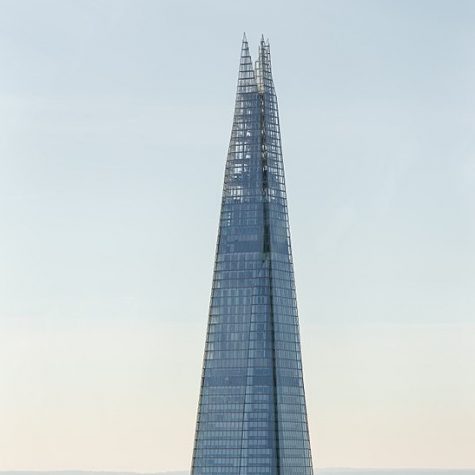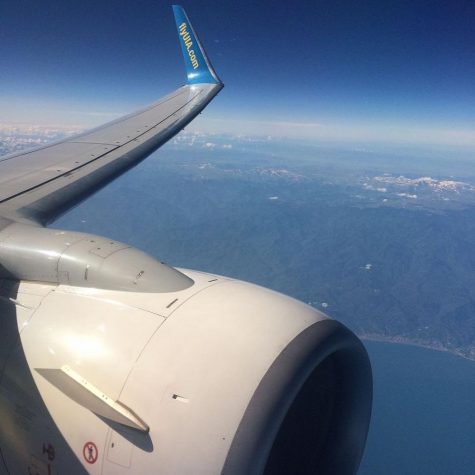Tech Talk
September 8, 2017
Shard Virtual Reality Slide
The View from The Shard recently unveiled two virtual reality experiences, introducing this technology to entertainment. Standing at 1016 feet, the Shard is a skyscraper located in Southwark, London. Visitors are strapped into a custom-built motion platform which has been planned perfectly to simulate the movement in the VR content. High-resolution 360-degree visuals allow riders to feel as if they are on a slide around the Shard. The Vertigo is the other adventure in which riders watch the building fall apart, stranding them in mid-air and forcing them to walk across balance beams in a construction site.
New iPhone
Many accidental leaks have revealed some of the new features of Apple’s new iPhone 8. The phone will allegedly have an edge-to-edge display, which means the removal of the home button and the front-facing camera. The touch ID will either be built into the display or eliminated and replaced with facial recognition. Since the display will now be made of flexible plastic OLED, the device will be thinner, will consume less battery and will have a more advanced display with a higher contrast ratio.
Military Drones
A technology firm in the US has designed a drone which has the ability to aim and fire at targets in mid-air. The Tikad drone, developed by Duke Robotics, is fully equipped with a machine-gun and a grenade launcher, which can only be fired through the control of a specific remote. The drone is designed to reduce military casualties by decreasing the number of ground troops required. Military officials in the US have expressed concern that these drones could easily kill civilians and that terrorists could create similar devices.
Boeing Pilotless Plane Testing in 2018
Wikimedia Commons
Boeing’s vice president of product design, Mike Sinnett, announced that the company is projected to test fly the first pilotless plane. The technology will first be tested in a cockpit simulator. Many airlines have been supporting the idea due to data that projects the need for more than 1.5 million pilots in the next 20 years. Pilotless planes could also increase safety, as research has shown that 50 to 60 percent of accidents are a result of crew fatigue.
This piece was originally published in the pages of the Winged Post on September 6, 2017.


















![“[Building nerf blasters] became this outlet of creativity for me that hasn't been matched by anything else. The process [of] making a build complete to your desire is such a painstakingly difficult process, but I've had to learn from [the skills needed from] soldering to proper painting. There's so many different options for everything, if you think about it, it exists. The best part is [that] if it doesn't exist, you can build it yourself," Ishaan Parate said.](https://harkeraquila.com/wp-content/uploads/2022/08/DSC_8149-900x604.jpg)




![“When I came into high school, I was ready to be a follower. But DECA was a game changer for me. It helped me overcome my fear of public speaking, and it's played such a major role in who I've become today. To be able to successfully lead a chapter of 150 students, an officer team and be one of the upperclassmen I once really admired is something I'm [really] proud of,” Anvitha Tummala ('21) said.](https://harkeraquila.com/wp-content/uploads/2021/07/Screen-Shot-2021-07-25-at-9.50.05-AM-900x594.png)







![“I think getting up in the morning and having a sense of purpose [is exciting]. I think without a certain amount of drive, life is kind of obsolete and mundane, and I think having that every single day is what makes each day unique and kind of makes life exciting,” Neymika Jain (12) said.](https://harkeraquila.com/wp-content/uploads/2017/06/Screen-Shot-2017-06-03-at-4.54.16-PM.png)








![“My slogan is ‘slow feet, don’t eat, and I’m hungry.’ You need to run fast to get where you are–you aren't going to get those championships if you aren't fast,” Angel Cervantes (12) said. “I want to do well in school on my tests and in track and win championships for my team. I live by that, [and] I can do that anywhere: in the classroom or on the field.”](https://harkeraquila.com/wp-content/uploads/2018/06/DSC5146-900x601.jpg)
![“[Volleyball has] taught me how to fall correctly, and another thing it taught is that you don’t have to be the best at something to be good at it. If you just hit the ball in a smart way, then it still scores points and you’re good at it. You could be a background player and still make a much bigger impact on the team than you would think,” Anya Gert (’20) said.](https://harkeraquila.com/wp-content/uploads/2020/06/AnnaGert_JinTuan_HoHPhotoEdited-600x900.jpeg)

![“I'm not nearly there yet, but [my confidence has] definitely been getting better since I was pretty shy and timid coming into Harker my freshman year. I know that there's a lot of people that are really confident in what they do, and I really admire them. Everyone's so driven and that has really pushed me to kind of try to find my own place in high school and be more confident,” Alyssa Huang (’20) said.](https://harkeraquila.com/wp-content/uploads/2020/06/AlyssaHuang_EmilyChen_HoHPhoto-900x749.jpeg)










